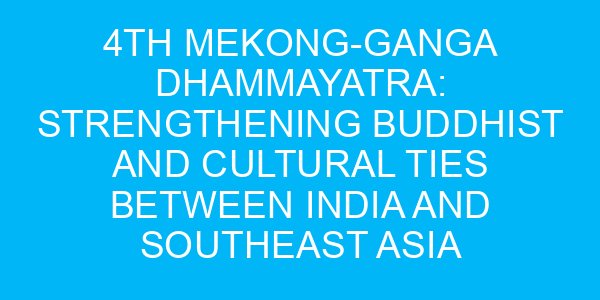A group of over 20 Buddhist scholars and citizens from Thailand recently arrived in Delhi for the 4th Mekong-Ganga Dhammayatra, a significant pilgrimage aimed at promoting the cultural and spiritual connections between the Mekong and Ganga civilizations. The event, led by Dr. Supachai Viraphuchong, is a crucial step in enhancing India-Thailand relations and fostering a shared commitment to peace, environmental awareness, and Buddhist principles.
This article explores the key aspects of the 4th Mekong-Ganga Dhammayatra, its purpose, cultural connections, and the leadership behind the initiative.
Purpose of the 4th Mekong-Ganga Dhammayatra
The primary goal of the Mekong-Ganga Dhammayatra is to spread the message of Dhamma, which focuses on the promotion of peace and environmental awareness. The event aims to connect the Buddhist traditions of India, Thailand, Vietnam, Cambodia, and Laos, underlining their shared values rooted in Dhamma. Organized by BodhiGaya Vijjalaya 980, with the support of various Indian and Thai organizations, the pilgrimage brings together diverse communities committed to spiritual growth and mutual cooperation.
Cultural and Spiritual Connections: India and Southeast Asia
Dr. Supachai Viraphuchong, a prominent figure in promoting India-Thailand cooperation, emphasized the deep cultural ties between Buddhist and Hindu civilizations. He highlighted how both share foundational values through Dhamma, promoting moral living and compassion. According to Dr. Supachai, this shared spiritual heritage forms the basis for closer cooperation among the nations of the Mekong region and India.
Leadership Vision: PM Modi’s Support for the Initiative
Dr. Supachai acknowledged Indian Prime Minister Narendra Modi’s strong support for the Mekong-Ganga Dhammayatra and his vision for the 21st century as the “Asian Century.” Modi’s leadership emphasizes the importance of spiritual and cultural ties in shaping a cooperative and peaceful future for the Asian nations. According to Dr. Supachai, the Dhamma principles offer a framework to address global issues such as poverty, environmental sustainability, and social inequality.
Dr. Supachai’s background as a monk further influences his commitment to spreading the values of compassion, morality, and service to the underprivileged, which are central tenets of the Buddhist philosophy.
Historical Context: Dhamma Diplomacy and the Declaration on Dhamma Century
The 4th Mekong-Ganga Dhammayatra follows the success of the third Mekong-Ganga Yatra and aligns with the “Declaration on Dhamma Century”, a vision that echoes PM Modi’s call for a united Asia based on shared spiritual values. Previous Yatras have brought to the forefront the cultural bonds between India and Thailand, and have deepened diplomatic relations between the two countries.
Mekong-Ganga Museum: Showcasing Shared Heritage
One of the key proposals made during the pilgrimage was the creation of the Mekong Ganga Museum, a cultural initiative that aims to highlight the shared heritage and civilizations of the Mekong and Ganga regions. Dr. Sacchidananda Joshi, a prominent scholar, proposed the idea of this museum to further enhance the cultural exchange and deepen the understanding of the historical connections between India and Southeast Asia.
Commemoration and Legacy: Honoring King Bhumibol Adulyadej
The 4th Mekong-Ganga Dhammayatra also commemorates the 97th birth anniversary of King Bhumibol Adulyadej of Thailand. This event not only honors his legacy but also celebrates the ongoing efforts to unite nations through the shared values of Dhamma. The Yatra serves as a reminder of the deep spiritual and cultural bonds that transcend geopolitical, religious, and cultural differences, reinforcing the idea of a united, peaceful Asia.
Key Takeaways:
- 4th Mekong-Ganga Dhammayatra aims to promote Dhamma, peace, and environmental awareness across India and Southeast Asia.
- Leadership Vision: Supported by Prime Minister Narendra Modi, who envisions the 21st century as the Asian Century, this initiative fosters spiritual and cultural ties.
- Shared Values: Both Buddhist and Hindu cultures share foundational values rooted in Dhamma, encouraging global cooperation.
- Mekong-Ganga Museum Proposal: A cultural initiative to showcase the shared heritage of these regions.
- Commemoration of King Bhumibol Adulyadej: The pilgrimage honors his legacy and celebrates the ongoing efforts to unite countries through Dhamma.
Conclusion: Understanding the 4th Mekong-Ganga Dhammayatra for Competitive Exams
The 4th Mekong-Ganga Dhammayatra serves as an important event not only for its spiritual message but also for its role in promoting cultural diplomacy between India and Southeast Asian nations. Students preparing for competitive exams can benefit from understanding the historical, cultural, and political significance of such initiatives. Recognizing the importance of Dhamma in global cooperation and the shared values between India and Southeast Asia provides valuable insights into both India’s foreign policy and its cultural diplomacy efforts.




